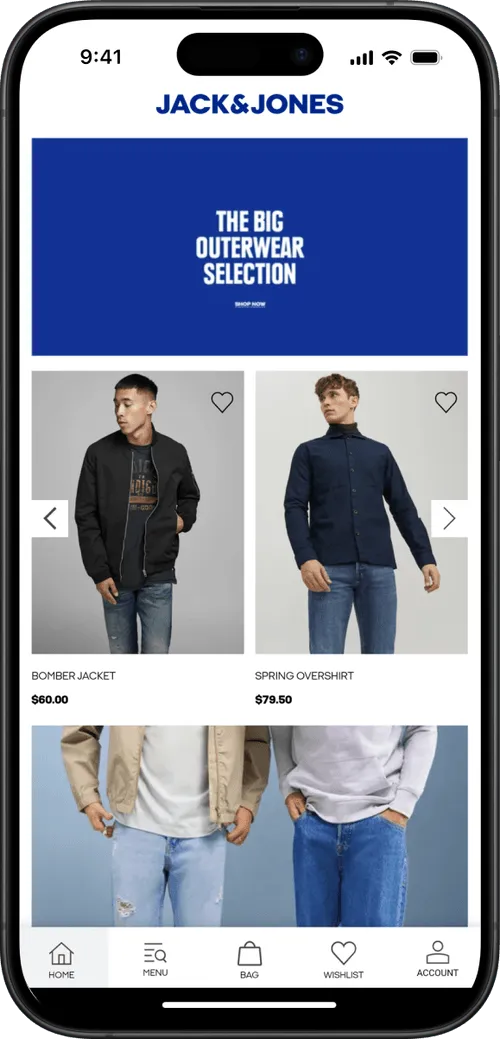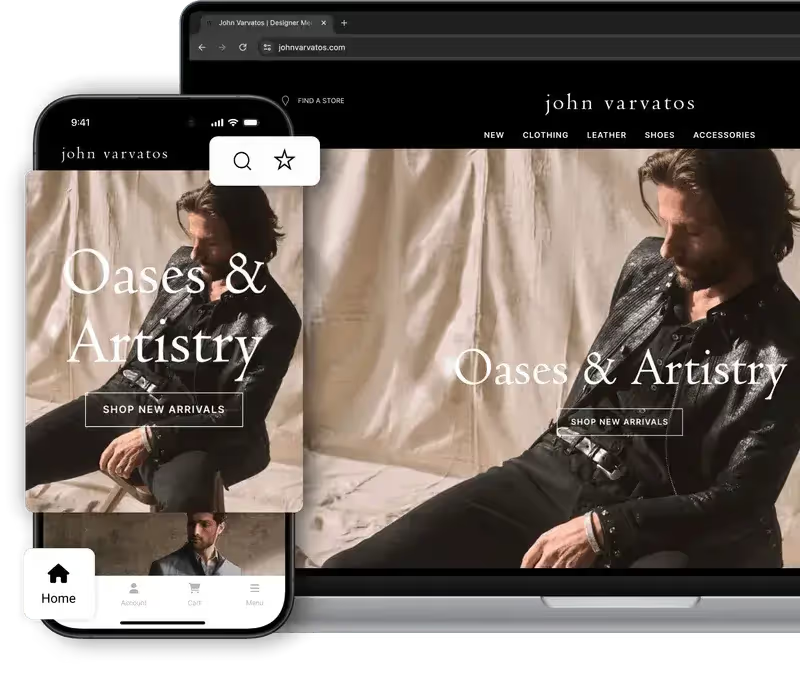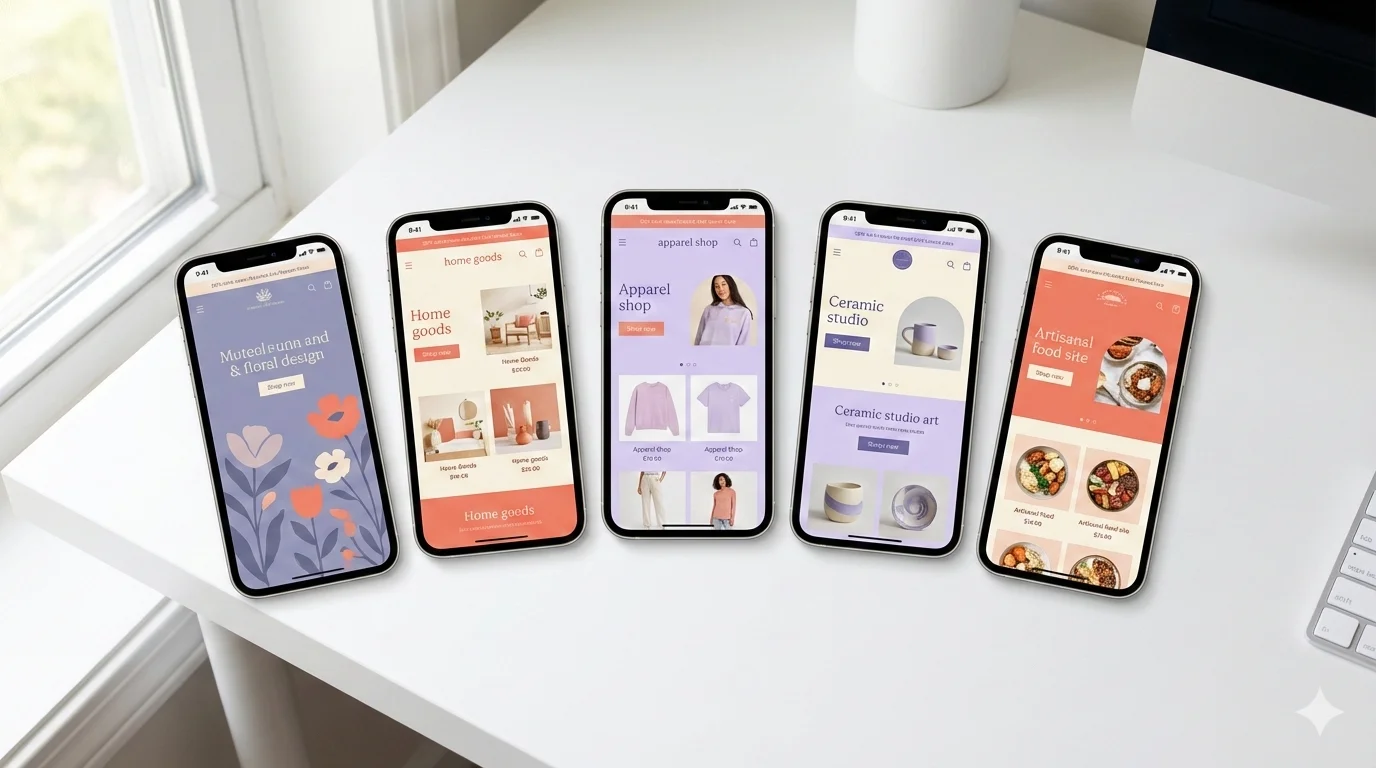Using the Shopify API for Mobile Apps
- The Shopify API gives you a convenient way to link mobile apps with your Shopify store.
- Shopify's storefront API allows you to build custom native apps on top of Shopify, while there are many DIY app builders that work using the API.
- For simple uses, the API works fine, but you will run into issues once you want to do something the API doesn't allow.
- The best way to build a mobile app for your Shopify store, without the constraints of the API, is to convert your site to apps with MobiLoud.
- The Shopify API gives you a convenient way to link mobile apps with your Shopify store.
- Shopify's storefront API allows you to build custom native apps on top of Shopify, while there are many DIY app builders that work using the API.
- For simple uses, the API works fine, but you will run into issues once you want to do something the API doesn't allow.
- The best way to build a mobile app for your Shopify store, without the constraints of the API, is to convert your site to apps with MobiLoud.
Shopify is one of the best platforms for eCommerce websites, and powers a quarter of all the eCommerce sites in the world (more than 4.65 million sites altogether).
But today, a website alone isn’t enough, and most successful eCommerce businesses have their own mobile app.
While there are many ways to build an eCommerce app, the one non-negotiable is that the backend of your app and website need to be synchronized, so order info, inventory and product details are shared across all your selling platforms. And while Shopify itself doesn’t have a feature that lets you build mobile apps, they do have an API that allows you to share data between app and website.
Keep reading to learn about using the Shopify API for mobile apps, and whether this is actually the best way to build your app.
What is the Shopify Storefront API & How Does It Work?
API stands for Application Programming Interface. It’s essentially a piece of code that lets software applications communicate with each other and share data, and is commonly used for websites or apps to get data from an external tool or server.
Shopify provides a number of APIs that allow third-party developers to create software applications for Shopify stores, or for Shopify businesses to extend the capabilities of their own store.
The storefront API is the one that’s most relevant if you’re looking to create a mobile app for your Shopify store.
This API is designed to enable headless eCommerce, which means decoupling the backend and frontend of your store, and building a custom UI.
In the case of building a mobile app, the custom UI would be the mobile app. The storefront API would allow you to manage all your content, product information, order details etc from the Shopify Admin panel, and populate the data in your mobile app.
The storefront API is compatible with a number of platforms, languages and frameworks, including:
- Android
- iOS
- Ruby
- PHP
- JavaScript
- React
The first step to utilizing the Shopify storefront API is to generate an access token from your Shopify Admin.
Shopify’s documentation has instructions on how to generate API credentials. Here’s a quick rundown:
- Start by creating a custom app in the Settings section of your Shopify Admin panel.
- Now configure your API access scopes (what the API can do - such as read and modify checkouts, read content, read and modify customer details).
- Install the app.
- Go to “API credentials”, where you’ll see your Storefront API access token, which you’ll use in your application.
Learn more about the Shopify Storefront API here.
How to Build a Mobile App with the Shopify API
So we know a little about what the Shopify API is and how it works. Now how can you actually use this to build a mobile app?
Generating an API token is the easy part. Actually building an app is a little more complicated.
There are basically two routes you can take to create a mobile app for your Shopify store using the Shopify API:
- Build a custom app from scratch.
- Use one of many Shopify app builders in the Shopify App Store.
Let’s look briefly at each option now, followed by the pros and cons of using the Shopify API to build an app.
Custom Development
Building a custom app means using mobile programming languages or frameworks to create a native mobile app, and using the API to link this app with your Shopify store.
Popular frameworks and languages for eCommerce apps include:
- Swift (for iOS only)
- Java/Kotlin (for Android)
- React Native (cross-platform)
- Flutter (cross-platform)
If you want to build a custom app, you’ll need a team of developers. You could bring them in on a permanent basis, hire freelancers, or contract an agency to supply the developers to build your app.
Custom development allows the most flexibility when building an app, but it’s also extremely expensive, time-consuming and complicated.
You’ll not only need to build a mobile UI from scratch, but build custom integrations for any Shopify apps or tools you use on your site.
Expect this to cost $50,000 minimum - not including ongoing maintenance after you launch, which can easily by 5 or 6 figures per year.
Shopify App Builders
The other option is to use a Shopify app builder, which is a no-code tool that’s already integrated with the Shopify API.
These tools let you build a mobile app yourself, without coding or hiring developers, with pre-built templates and a drag-and-drop builder.
App builders are more convenient and much cheaper than building custom apps from scratch, and are more likely to work within the budget and capabilities of small or medium-sized eCommerce businesses.
However, they’re also very limiting, and you may find it difficult to create the ideal app for your store. Many of these limits are due to the Shopify API itself, which we’ll discuss in more detail in the next section.
Learn more about the pros and cons of DIY app builders here.
Pros and Cons of the Shopify API
There are definitely a lot of good things about Shopify’s APIs and the tools they give developers. But in our opinion, there is also some downside to it.
Here’s a closer look at the pros and cons.
Pros
- Stable, well-constructed with good documentation.
- Works with a variety of programming languages and frameworks.
- Scalable, with a high level of security and no rate limits.
- A convenient way to integrate the basic necessities of your store in a mobile app.
Cons
- Building custom mobile apps with the API requires a high level of technical expertise.
- There are limits to what the API allows you to do; syncing things like order details and simple product information is easy, but more precise features (such as complex collections, sort orders and checkout flows) are limited with the API.
- Some apps or plugins aren’t supported by the API.
- The API won’t support any custom features you’ve built on your Shopify store.
Rainbow Shops ran into issues with their app, which was built with an API-based app builder, as their VP of eCommerce and Marketing, David Cost, says:
“The Shopify API only enables certain things and all the major providers of apps for Shopify had limitations that the Shopify API would not let them get around.”
Rainbow had problems integrating the extensive optimizations they had made with collections and product variations in their app, due to the limitations of the API. These changes had proven to make a significant impact on conversions on the website, so it put a cap on the potential of their mobile app.

A Better Option: Convert Your Store to Mobile Apps with MobiLoud
The solution for those who want to build an app for their Shopify store, that syncs with their website, but doesn’t have the constraints and limitations of the Shopify API, is to convert the site to apps with MobiLoud.

MobiLoud is a managed service that converts websites into mobile apps. The apps look and feel just as good as custom mobile apps, and are fully synchronized with your website, but without relying on any APIs.
We reuse most of what is already on your website - the same design, product information, apps and integrations - and mix it with native features to give a proper native look and feel to your mobile apps.
This offers a lot more flexibility and fewer limitations, without the headache and expense of hiring developers.
More than 2,000 businesses have used our service to create their mobile apps, including many high-revenue Shopify stores (check out some examples here).
To get an idea of how MobiLoud works, book a demo and get a free preview of your app now.
What Makes MobiLoud a Better Option?
MobiLoud is ideal for eCommerce businesses, because your app doesn’t need to do anything significantly different to your website.
If you have a well-optimized and responsive mobile website, you’re 90% of the way to having a great-looking mobile app. All that’s needed are some small UI tweaks, and integration with native mobile push notifications.
Custom development is overkill for Shopify sites, while app builders limit you too much.
Here’s more reasons why MobiLoud is the best way for Shopify stores to launch a mobile app:
- We convert everything from your website into the app, including all apps and integrations and custom features.
- No integration limits or hidden fees to use specific Shopify apps (e.g. Klaviyo, Yotpo, etc) in your mobile app.
- It’s fully managed - virtually nothing for you or your team to do.
- Fast and affordable - launch in less than a month, for a minimal investment.
- There’s no rebuilding required, and all your website features work seamlessly, out of the box.
- Your app updates as your site does - no difficulties or inefficiencies trying to stay consistent across app and website.
- There’s minimal overhead, as you don’t need to manage the app separately.
- Unlimited push notifications are included and built in, using leading push provider OneSignal.
- App maintenance and updates are included.
- App store submission is done for you.
How to Build a Shopify App with MobiLoud
With MobiLoud, you can launch an app for your Shopify store in three simple steps:
- Book a demo and get a preview of your app - it's free, with no obligation, and you can get answers to any questions you have about how MobiLoud works.
- Share any special requirements you have for the app, then pass it off to our team.
- Leave it to us. We’ll build your app, test it (you’ll have the ability to test and give feedback too), and finally submit it to the app stores for publishing. In essence, we handle everything app-related. You just keep managing your website and business like normal.
It’s really that simple. It costs a tiny percentage of what a custom app does, yet the end result is indistinguishable from the kind of app some brands pay millions of dollars for.

Book your free preview now and start building your hassle-free Shopify mobile app, with no limitations and no risk.
FAQs
Convert your website into a mobile app











